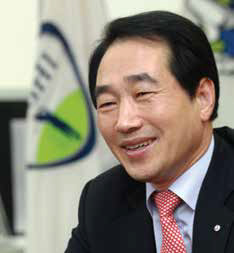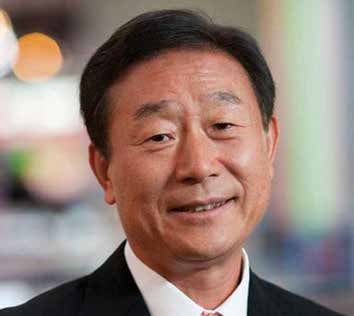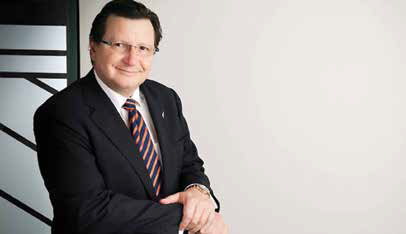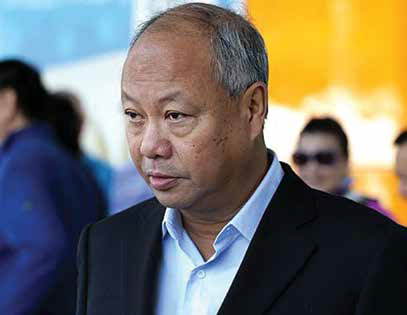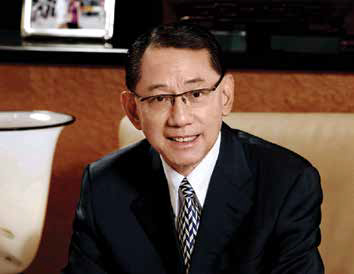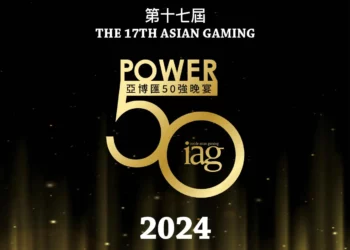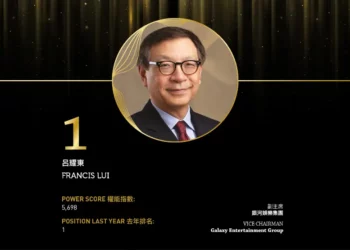31 Thomas Arasi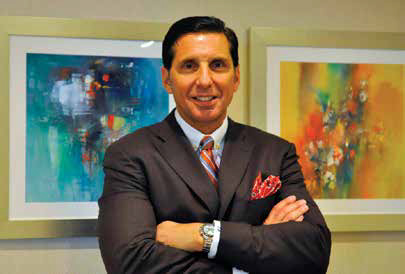
President and CEO
Solaire Resort & Casino
Some call Thomas Arasi the Cary Grant of Asian gaming. The veteran hospitality executive is a class act, a good fit for Manila’s Solaire Resort & Casino, the bayfront casino resort a step above anything that market had ever seen. Solaire is the first integrated resort in Entertainment City, the casino cluster Philippine officials hope will put Manila on the regional gaming map.
Mr Arasi joined Solaire last October, after owner Enrique Razon terminated its operating agreement with Global Gaming Asset Management, headed by William Weidner, the former Las Vegas Sands president and COO. Ironically, Mr Arasi first made his mark in Asian gaming as CEO of Singapore’s Marina Bay Sands following Mr Weidner’s departure from LVS in the depths of the global financial crisis in 2009.
At MBS, Mr Arasi was credited with getting the US$6.5 billion resort opened, no small feat in the wake of the crisis and ensuing near-bankruptcy of LVS. Mr Arasi helped the resort deliver its intended punch as an iconic Singapore landmark. He also delivered on the financial side. In its first full quarter of operations, MBS set company records for adjusted property EBITDA and EBITDA margin. “[W]e are gratified by the overwhelming reception the property has received,” LVS Chairman Sheldon Adelson said at the time.
Yet, three months later, Mr Arasi abruptly left. It’s unknown whether he jumped or was pushed as gaming revenue plateaued under the realities of trying to grow VIP business under Singapore’s de facto junket ban.
But in barely 18 months, Mr Arasi made a lasting impression. Attending a conference at MBS a year after leaving, staff greeted him warmly everywhere he went. A barista remembered the soy milk in his double-shot latte. He also impressed at a recent gaming conference
in Tokyo by presenting in Japanese.
Since joining Solaire, industry observers say Mr Arasi refocused marketing efforts on junkets and local players and brought cost discipline to all aspects of operations. However, the main mission for Mr Arasi, who is also a director of Solaire parent Bloomberry Resorts, is to deliver on Solaire’s $700 million Phase 1A expansion, which includes a 312-suite tower, luxury shopping mall and theater and is designed to transform Solaire into a genuine integrated resort. Its November debut is likely to follow the opening of City of Dreams Manila, the second of Entertainment City’s four resorts.
Mr Arasi welcomes the company. “What is the one thing that is common in integrated resorts, car dealerships and restaurants? They all like to be next to each other,” he told the Philippine Business Mirror. “The integrated resorts business does better when they cluster together.”
He envisions Entertainment City growing into one of the world’s leading IR destinations. “After Macau and Las Vegas, you now have us and then Atlantic City. There’s really no critical mass of integrated casinos after that.” He is confident that Solaire can hold its own in its cluster. “I’m of the opinion that when the others open we will still have the premier property in Entertainment City, and that will speak for itself.”
32 Choi Hung-jib
President and CEO
Kangwon Land Inc.
A 50% share in any market is pretty impressive, but Kangwon Land goes that one better in South Korea, where it holds 100% of the legal casino gambling market for Koreans. Last year, Kangwon’s monopoly on local players raked in 1,277 billion won (US$1.26 billion) in gaming revenue, up 5.3% from 2012.
But Kangwon Land’s exclusive hold on domestic players expires in 2025, and CEO Choi Hung-jib, who took office in 2011, is in charge of preparing for that day. The company’s stated goal is to have a worldclass replacement by 2020, not just to secure its own post-monopoly future but to continue its overriding mission to contribute to the economic revival of Gangwon Province, its host region. Mr Choi’s background in local and regional administration, including a stint as a lieutenant governor of Gangwon, suggests he’ll hold that focus.
Gangwon is a former coal mining area shut down as part of a government drive in the late 1980s to close inefficient mining operations. The authorities promised alternative economic plans for these areas, with the big prize of a casino for Korean players to be awarded to the most depressed region. The town of Sabuk in Gangwon, about 230 kilometers east of Seoul, was the winner. Kangwon Land, 51% owned by government entities, was formed in 1998 to restore the community’s economy and ecology. A small casino began taking bets in 2000, and a full-scale hotel, casino and theme park opened in 2003.
The casino has grown from 30 table games at the outset to 200, with 1,360 slot machines, in an expansion completed in June of last year, all under the watchful eye of the Ministry of Culture, Sports and Tourism. Restrictions on the casino to discourage problem gaming have expanded over time as well, including a ban on Koreans entering the casino more than 15 days a month, and Kangwon Land runs rehabilitation centers for problem gamblers on site and in Seoul.
To create a complete resort destination, Kangwon has added a convention hotel and attractions such as a ski resort, golf course and vacation homes under its High1 Resort brand. A US$150 million indoor-outdoor water park is due for a soft opening in the second half of 2016. Having the 2018 Winter Olympics in nearby Pyeongchang will bring new roads that will shave an hour or more off the now-harrowing threeand- a-half-hour drive from Seoul as well as highlight the region’s recreational charms.
But for now Kangwon is all about gaming. Second-quarter gaming revenue grew 16.2% to KW355.6 billion, while table volume increased 9%, attributable to last year’s expansion, according to the company. Net profit rose 32.8% to KW123.6 billion. Non-gaming revenue, less than 7% of the total, fell 16.3%, which management attributed to cancellation of bookings during the national mourning period following the ferry sinking in April that left 302 people dead or missing.
South Korea’s loosening of its policy on foreigners-only casino development is not expected to impact Kangwon Land as a gaming destination. With up to four times more players than seats on weekends and a vibe at the tables that one player compared to a factory assembly line, bettors are there because they have no other choice. If Korea lifts its ban on local players at other casinos, then all bets are off.
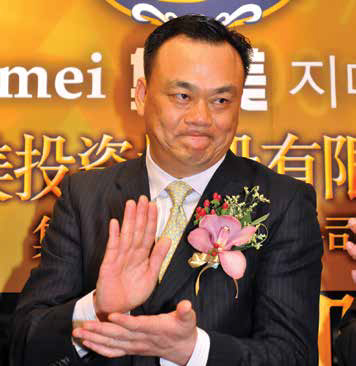
33 Jack Lam
Chairman
Jimei Group
Jack Lam has become the latest Macau junket operator to seek access to cheaper and more stable funding through the equities markets by conducting a backdoor listing on the Hong Kong Stock Exchange. Hong Kong-listed Sinogreen Energy International Group Ltd, a company trading in chemical and energy conservation products, announced in July that Mr Lam along with two British Virgin Islands-registered entities would buy 65.9% of its shares for HK$113.8 million.
The deal comes at a time when Mr Lam and his junket rivals are reeling from a slowdown in Macau VIP revenues as credit tightens in mainland China and Beijing steps up its anti-corruption drive.
Mr Lam’s Jimei Group is believed to rank among Macau’s top five junket operators by rolling chip turnover, and as a measure of his prominence he is one of the few junketeers to run a property in his own right, having taken over the Casino Oriental at the former Mandarin Oriental back in 2009 with the blessing of its owner, Stanley Ho’s Sociedade de Jogos de Macau. Located under the roof of the renamed Grand Lapa Macau, the refurbished and rebranded Jimei Casino operates as a “satellite” of SJM in exchange for a share of revenues.
In addition to Grand Lapa, the 53-year-old Mr Lam sits atop an empire consisting of some of Macau’s leading VIP rooms and a diverse portfolio of investments in property, financial services, tour and travel, casino cruises, a resort in the Philippines, a junket room in one of Seven Luck’s popular foreigners-only casinos in Seoul and the addition last year of a VIP operation at Solaire Resort & Casino in Manila.
It’s the Philippines where Mr Lam’s most audacious investment is located. His sprawling Fontana Leisure Parks complex, a holiday getaway located in the Clark Special Economic Zone about 80 kilometers north of Manila, has grown to become Jimei’s flagship—a collection of family-style holiday villas and timeshares, a hotel, a water park, golf courses, fitness facilities, a sauna and spa, restaurants, meeting and convention space and a boutique casino—a leisure city within a city, catering both to locals and to a Chinese and Korean clientele that Jimei has come to know intimately over the years. Fontana marked its 10th anniversary in April.
Mr Lam was born in Guangzhou and moved to Hong Kong at the age of 18. He started out as a bookkeeper at an uncle’s factory, earning HK$1,000 a month. He got his introduction to gaming through his uncle, who gambled regularly in Macau. While accompanying his uncle on trips to the city’s casinos he built up a network of contacts and started working as a junket sub-agent, a position that gave him insight into the nuts and bolts of building and maintaining customer relationships. By the early 1980s, he was working as a small-time junket representative in Macau. Through diligence and a solid understanding of his clientele, he gradually emerged as a leader in the industry.
34 Sonny Yeung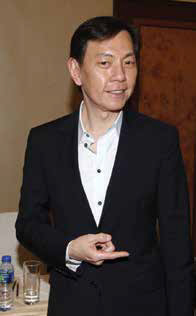
Chairman
Success Universe Group
Sonny Yeung is raising his stakes in mainland China’s fast growing lottery sector while withdrawing from his investment in an under performing Hong Kong-based casino cruise ship.
Mr Yeung’s Hong Kong-listed Success Universe Group, best known for its 46.8% share of Macau casino resort Ponte 16, inked a deal in March to provide telephone sales services to the Shanghai Welfare Lottery Issuance Center. Shanghai is the fourth mainland location Success Universe has landed since it got involved in the China lottery sector in 2012. It also supports sales of the Sports Lottery in Heilongjiang, Jiangxi and Qinghai provinces and operates an online lottery sales platform.
Mr Yeung, who served as a member of the Chinese People’s Political Consultative Conference for 20 years until 2013, is optimistic about his lottery investment, as well he should be. Total sales of China’s Welfare and Sports lotteries stood at RMB178.4 billion (US$29 billion) in the first half of this year, up 19.2% from the same period in 2013. Mr Yeung, a half-brother of Macau casino investor Albert Yeung, expects Success Universe’s lottery division will record its first profit this year. Turnover reached HK$70.6 billion last year ($905 million), up more than sixfold from 2012, with its loss narrowing to HK$13.4 million from HK$21.9 million. The division will become “another driving force” of Success Universe’s profits, says Mr Yeung.
Ponte 16, one of Sociedade de Jogos de Macau’s 14 “satellite” casinos, is 51% owned by SJM, with Success Universe acting as the third-party promoter, effectively controlling most of the business. The property got off to a sluggish start following its February 2008 opening but has recorded continual improvement in its operating results since then. It recorded its first profit in 2011, and last year saw EBITDA increase by 19% to HK$387.3 million.
Ponte 16’s trademark attraction is Asia’s first and only Michael Jackson museum, which records the milestones in the King of Pop’s career and displays a collection of more than 40 artifacts (including the famous rhinestone-encrusted glove MJ wore the first time he performed the “moon walk” on American television). The property’s other major non-gaming draw is its unique location at Macau’s Inner Harbour. It’s a somewhat rundown neighborhood but it offers easy access to the city’s UNESCO World Heritage sites. Part of its remit, in fact, is to revitalize the surrounding area.
Best of all, it cost only HK$2.4 billion to build (US$310 million at current exchange rates), a modest sum by contemporary Macau standards. Construction of the third phase of the resort, originally scheduled for completion this year, has yet to commence. The latest word from Success Universe is that the expansion— which will add a waterfront shopping arcade with a total floor area of approximately 40,000 square meters, including space for the expansion of gaming areas and car parks—is still being reviewed by the Macau government.
Meanwhile, the company announced in July that it had entered into a memorandum of agreement to sell its 55% interest in its Hong Kong-based cruise ship operation for HK$93 million. Profit generated by the M.V. Macau Success has been plunging, from HK$7.8 million in 2011 to $500,000 in 2013 on the back of spiraling operating costs.
Mr Yeung’s formative gaming experience was as a VIP room operator at Stanley Ho’s Casino Lisboa. Their relationship paid dividends when he was able to broker the investment deal with Mr Ho for Ponte 16, and Success Universe now deals to VIPs in its own rooms.
He keeps a relatively low profile in the operation, and his nephew, Hoffman Ma, the company’s deputy chairman, is the public face. Mr Ma told the Hong Kong Economic Journal in August that Success Universe will actively seek its own gaming license when the government begins reviewing its gaming policies next year.
35 Yoji Sato
Chairman
Dynam Holdings
Pachinko king Yoji Sato is looking ahead to the likelihood that the Japanese government will legalize casinos and is positioning his Dynam Holdings to be a major player when it does.
When Dynam announced earlier this year that it was in talks with several top operators—Melco Crown Entertainment, Galaxy Entertainment, SJM Holdings and South Korea’s Paradise Group among them—on a possible tie-up for a resort casino in its native country, the aggressive hand of Mr Sato was clearly in evidence.
Renowned for a marketing and investment savvy that are rare in Japan’s staid machine gaming industry, he took Dynam public in Hong Kong back in 2012—the first pachinko operator ever to do so, in fact, the first Japanese company in history with a primary listing on the HKSE—and followed that up last year with a HK$273 million investment in Macau Legend Development’s IPO.
Interestingly, the 68-year-old was in supermarkets, not gaming, when he took two Tokyo arcades he inherited from this father and built them into the second-largest machine gaming operation in Japan with an innovative Wal-Mart style sales strategy that emphasizes value and now encompasses 375 pachinko halls and delivers more than HK$12 billion (US$1.5 billion) in annual revenues.
He believes pachinko has global potential as an entertainment proposition, a conviction he first tested several years ago in South Korea, where the game became such a sensation—the number of arcades ballooned to 7,000 in just one year—the government shut it down.
He plans to test it again in Macau. His partnership with Macau Legend calls for inclusion of a pachinko gaming area at the new Macau Fisherman’s Wharf. He’s got a seasoned Korean team to head it and a pipeline of next-generation games that will offer varying skill levels of play and other new features.
36 Nigel Morrison
Managing Director
SKYCITY Entertainment Group
SKYCITY Entertainment Group operates three monopoly casinos in New Zealand—in Auckland, Hamilton and Queenstown— and two in Australia, in Adelaide and Darwin.
Profit for the financial year ended 30th June fell 22.6% to NZ$98.5 million (US$82 million), though on a normalized basis, factoring out fluctuations in win percentage in the high-roller segment, it was down a more moderate 8.1% to NZ$123.2 million, and normalized revenue was off only 2% at $$843.3 million.
An improved performance at the company’s flagship Auckland property and relatively steady returns from Darwin and Adelaide were masked by the impact on Australian earnings of a strong New Zealand dollar, which was on average worth 13% more relative to the Aussie unit over the 2013-2014 financial year. Revenue was also impacted by the ongoing A$300 million revamp of Adelaide Casino into “a truly world-class integrated entertainment complex,” as Auckland-based CEO Nigel Morrison describes it. The company started on the remodeling after finalizing an agreement last October with the South Australian government on a new licensing agreement that includes a 20-year extension of its casino monopoly in the state to 2035, a lowering of gaming taxes on VIP revenue, permission to introduce cashless gaming and TITO systems, and increases in the permitted numbers of gaming tables and slots.
Last year, SKYCITY secured an extension of the license at its flagship Auckland property—from 2021 to 2048—together with permission to add 230 more slot machines and more gaming tables as part of an agreement with the New Zealand government to build a convention center in the country’s most populous city. Though construction of the Auckland convention center has yet to commence, Mr Morrison last month announced a major expansion of the project, with plans to add a 300-room five-star hotel, upgraded pedestrian access and additional car parks, which together have raised the budget from an original NZ$402 million to more than $500 million. SKYCITY plans to lodge an application for the project in the fourth quarter, with groundbreaking foreseen in the middle of 2015. In an effort to draw more high rollers, Mr Morrison also is adding new VIP gaming rooms and accommodations.
He is well acquainted with the preferences of those high rollers from his previous role as CFO at Macau casino giant Galaxy Entertainment Group. He joined SKYCITY as managing director in 2008. He was at one time chief operator officer for James Packer’s Crown Limited (now Crown Resorts) and is a former CEO of the Federal Group, the venerable Tasmania hospitality giant that is the island’s largest machine gaming operator. Before embarking on his casino career in 1993, he was a corporate finance partner with Ernst & Young in Melbourne, specializing in the gaming industry.
37 Tony Fung
Founder and Chairman
Aquis Reef Holdings
The Australian Competition and Consumer Commission lastmonth gave the green light to the purchase of the Reef Hotel Casino in Cairns by Hong Kong billionaire Tony Fung’s Aquis Reef Holdings. The anti-trust regulator had previously expressed concern over the deal—announced in February—given Aquis is separately seeking approval to build a A$8.15 billion resort nearby at the Great Barrier Reef, but concluded that there would be limited crossover between the two operations because the latter would focus on attracting overseas VIP customers while the existing casino caters mainly to local residents and domestic tourists making relatively low-stakes bets.
Mr Fung envisions Reef as a staging ground for Aquis to learn the market and generate cash flow as it seeks financing for the Barrier Reef super-resort, which would represent the largest tourism investment ever in Australia.
If it goes forward as planned, 340 hectares of tropical farmland in Yorkeys Knob, a sleepy beachfront hamlet 13 kilometers north of Cairns, will be transformed with eight hotels containing 7,500 hotel rooms—nearly twice the rooms now available in Queensland’s entire tropical north—two theaters, convention space, luxury residences, retail shopping, a cultural center, an aquarium, a golf course and a sports stadium, plus a casino with 750 table games and 1,500 gaming machines, the whole to be completed in two stages over 10 years around an artificial lake and reef lagoon. The $4.3 billion first phase, scheduled to open in 2018, would include 4,000 hotel rooms.
The Queensland government, intent on attracting wealthy Chinese gamblers to the state, has promised Aquis a casino license pending environmental, planning and other approvals. Queensland attracted 297,000 Chinese visitors last year, including 259,000 holiday-makers, usually bigger spenders, and garnered $604 million of Australia’s $3.55 billion in Chinese visitor expenditures. A Queensland tourism report projects that total expenditure by overnight visitors in the state will grow from $21.5 billion in 2012 to $30 billion in 2020. Nationally, Chinese visitors are expected to account for one-third of expenditure growth. For Queensland that math indicates $2.85 billion in additional Chinese visitor spending.
Tony Fung has 15 years of Queensland investment experience under his belt and holdings that include shopping malls and residential and commercial property in Australia, China and the United States. The 62-year-old scion of one of Hong Kong’s bestknown real estate and financial services families is a savvy dealmaker credited with building the Hong Kong Convention and Exhibition Centre. To him, Aquis holds obvious appeal to Chinese travelers seeking a punt overseas. “I think it will be an easy sell for us,” he says. “You see, if you go to Macau your colleagues think you are a gambler. If you go to Singapore they think you are a gambler. But if you say you are going to Cairns and the Great Barrier Reef, then you are still a family man.”
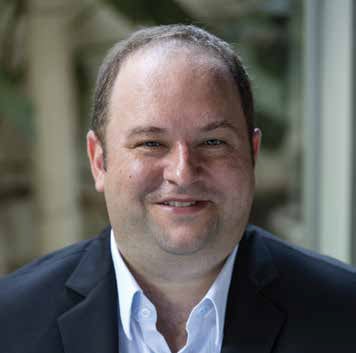
38 Colin Pine
General Director
Ho Tram Project Company
MGM Resorts International pulled out as management partner of Vietnam’s The Grand Ho Tram Strip on the eve of the US$500 million resort’s much-anticipated opening last July. That it got open at all is a tribute to the reputation, the steady hand and the lobbying skills of Colin Pine.
Mr Pine heads Ho Tram Project Company, which took the helm after MGM’s exit as a subsidiary of Asian Coast Development (Canada) Limited, the investment consortium that conceived The Grand and whose backers include American hedge fund tycoon Philip Falcone.
Mr Pine is well-known and respected in Vietnam and was able to negotiate with the central government on reforms to regulations concerning tax and international banking transactions to bring the country into line with international norms prevailing in other major gaming jurisdictions. A fluent Vietnamese speaker who’s been working and investing in the country for 18 years, he is credited with winning approval for the first foreign-owned school in Hanoi to acquire land for a purpose-built campus. At one time he ran a Vietnamese company that acquired a foreign-owned five-star hotel. He also helped found the country’s first privately owned airline.
Challenged by a longstanding ban on domestic play and its distance from Ho Chi Minh City, about a two-hour drive under current conditions, The Grand has struggled to recoup its investment. For all that, though, it is a beautiful property, Vietnam’s first true destination casino, with 541 five-star hotel rooms and loads
of inherent appeal. It fronts two kilometers of gorgeous beach on the South China Sea coast of Ba Ria-Vung Tau province, surrounded by protected forest land, and now boasts a Greg Norman-designed golf course that is holding its official ribbon-cutting next month.
The game changer for The Grand would be an end to the prohibition on domestic play, something Mr Pine and his team have been working to achieve. The Ministry of Finance has drafted a new set of gaming regulations that includes a provision for opening the country’s casinos to its 90 million citizens, and political momentum appears to be building in favor of it. The draft is slated to be submitted to Prime Minister Nguyen Tan Dung this fall and could be approved by the end of the year.
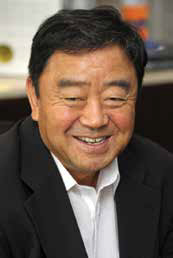 39 Lim Byoung-soo
39 Lim Byoung-soo
President and Chief Executive
Grand Korean Leisure
In his first year heading Grand Korea Leisure, Lim Byoung-soo has delivered mixed results. Perhaps that’s to be expected from a government-controlled company with a somewhat restrictive mandate. GKL was founded in 2005 as a subsidiary of the Korea National Tourism Organisation. In 2009, 30% of its equity was floated on the Seoul Stock Exchange. Its core mission, however—promoting tourism, raising money to fund tourism projects and helping to reform the Korean image of gaming as a social evil—didn’t change.
Nationally, tourism promotion seems to be working, welcome news for the government. Casinos play a role, but the main growth engine is hallyu, the so-called Korean Wave of pop culture engulfing Asia. Visitor arrivals to South Korea show a double-digit compound annual growth rate over the past five years, reaching a record 12.2 million in 2013. The government claims tourism created an estimated 240,000 jobs last year, four times more than the nation’s 47 largest companies combined.
Over those same five years, visitors from China have grown from 1.3 million to 4.3 million, last year overtaking Japan as the country’s largest source market. Korea is the most popular destination for Chinese travelers after Hong Kong and Macau. Chinese visitor arrivals rose 46% in the first seven months of this year, toward a projected total of 5 million.
Many of those tourists are visiting Korea’s 16 foreigners-only casinos. Casino visits have posted a 12.7% CAGR since 2009, reaching 2.7 million last year, with a 10.6% CAGR for gaming revenue.
Both figures surpass growth rates at the sole casino open to Korean citizens, Kangwon Land, in the remote northeast of the country. In each of the past two years, revenue at foreigners-only casinos has overtaken Kangwon Land’s, last year by about US$60 million in a $2.7 billion market.
Chinese tourists lead the casino growth story. Last year, 1.35 million Chinese visited Korea’s casinos, almost half of total visits. The Japanese, formerly frontrunners, now comprise 26.1% of visitors, a number deflated in part by political tensions, including offshore territorial disputes between the two governments.
GKL belatedly shifted its focus from Japanese to Chinese players at its three Seven Luck brand casinos, two in Seoul and one in Busan. In the second quarter, Chinese were a record high 47% of GKL’s total visitors, but overall visitor numbers fell 14.4% from a year earlier. Table game volume rose 3.1% in the second quarter, but gaming revenue decreased 13.8% to KW113.5 billion on low hold. GKL’s quarterly net profit tumbled 69.1% to KW9.3 billion after a 9.3% rise in the first quarter. Profit margins, generally tops in the local industry, plunged into the single digits.
While consistently attracting a majority of casino visitors owing to its prime Seoul locations, GKL hasn’t parlayed that advantage into gaming revenue. Its Seven Luck casino at the Millennium Seoul Hilton attracts nearly twice as many visitors as any other casino in Korea, nearly 1 million last year. But its KW182.8 billion in casino revenue was barely one-third of that at rival Paradise Group’s flagship Seoul casino, Walker Hill, due mainly to Walker Hill’s dominance of the VIP sector.
Since the start of 2013, GKL has retreated from running neck and neck with Paradise in market share by revenue into a firm second place. Over the last six quarters, GKL’s share has bobbed in percentage terms in the mid-30s to low-40s range, compared to Paradise’s mid-40s to low-50s. The gap is likely to widen when Paradise launches Korea’s first integrated resort, slated to open near Incheon in early 2017. GKL hopes to counter that by expanding its Seoul Gangnam branch within the next two years. Management is also pursuing approval to operate casino cruises. In August, the Ministry of Culture, Sports and Tourism announced it would streamline the approval process for new casino projects to boost tourism and spur economic development.
That could be a signal for Mr Lim to lead GKL into the IR business.
40 Albert Yeung
Chairman
Emperor Group
The work-to-rule action at Grand Emperor Hotel & Casino on 24th to 25th January marked the beginning of a wave of protests by gaming floor staff across Macau demanding improved wages and benefits. The end result was an effective doubling of the annual bonus paid to the casino’s employees.
The prospect of rising wage costs may appear to augur ill for Grand Emperor at a time of weakness in the city’s VIP sector, but, surprisingly, the property derived 76% of its gaming earnings from the mass market over the past year—a far greater proportion than other so-called satellite casinos operating under the license of Sociedade de Jogos de Macau—and is striving to further increase its appeal to main-floor players.
The 288-room Grand Emperor opened in 2006 in downtown Macau and features actors at the front doors arrayed in the red tunics and bearskin hats of Britain’s famed Coldstream Guards and real gold bars recessed in the lobby floor—seemingly kitschy features that nevertheless delight mainland Chinese visitors in search of snapshots. The property recorded a 10.5% increase in gaming revenue to HK$2.05 billion (US$264.5 million) in the 12 months ended 31st March, accounting for 90.5% of the total revenue of Hong Kong-listed Emperor Entertainment Hotel, a subsidiary of Albert Yeung’s Emperor Group. Emperor Entertainment also expanded its capacity in Macau in March with the HK$900 million acquisition of the 262-room Best Western Hotel in Taipa.
Starting out with a single watch shop, Mr Yeung has built a diversified empire with holdings in entertainment, property and finance and has accumulated a net worth of US$1 billion, according to Forbes magazine. Prior to building his own casino hotel in Macau, the 70-year-old entrepreneur had held interests in two VIP rooms at Casino Lisboa, the erstwhile flagship property of Macau gaming tycoon and Mr Yeung’s friend Stanley Ho.
Mr Ho has said of Mr Yeung, “No difficulties can baffle him, nor are there any hurdles he cannot overcome.”
The compliment perhaps stems partly from gratitude for the profits Mr Ho derived from his Do Son casino in Vietnam, made possible by a casino license Mr Yeung had sold him. According to Albert Yeung’s official biography, published in 2012, Mr Yeung had acquired the license in 1993 but chose not to pursue it after being told “It’s not time yet” by a long-trusted feng shui master, leading him to hawk it immediately to Mr Ho. Do Son went on to record a decade of profits but has since slipped into the red.
The time for Mr Yeung to develop his own casino came in 1995, after he joined a delegation of Hong Kong business people visiting North Korea at a time when Pyongyang was seeking to develop its Rason economic zone bordering China and Russia. The Emperor Resort & Casino in Rason opened in 1999 and mostly serves Chinese players making the hour’s drive across the border.
Mr Yeung has been dogged by controversy, too, including allegations of involvement in organized crime and graft, which he has repeatedly denied. Last year, he filed an injunction against Google seeking to compel the Internet search giant to take down automatic search suggestions featuring allegedly libelous content that links him to triad groups. The trial is ongoing after an August ruling by Hong Kong’s High Court that rejected Google’s attempt to halt the case.
Mr Yeung is reported to have close ties with some of Beijing’s top officials and Hong Kong’s property tycoons. As he said in his biography: “Li Ka Shing, Cheng Yu Tung and [Stanley] Ho Hung Sun all attach great importance to our friendship. This proves that I am not really bad.”







